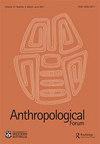Pluralities of Power in Indonesia’s Intellectual Property Law, Regional Arts and Religious Freedom Debates
IF 0.7
3区 社会学
Q3 ANTHROPOLOGY
引用次数: 6
Abstract
ABSTRACT This article re-analyses historical Southeast Asian power concepts and practices to interpret contrasting positions on two contemporary Indonesian legal debates. The first debate concerns the use of intellectual property models to regulate regional arts or ‘traditional cultural expressions’. The second debate concerns a 2017 constitutional court ruling that advocates citizenship parity for ‘belief practitioners’, meaning those who maintain ancestral or non-orthodox practices and do not list one of Indonesia’s six official religions on their identity cards. I argue that contrasting positions on the laws held by state and clerical authorities versus regional practitioners are better explained by reference to distinctively Southeast Asian ideas about unilateral versus decentralised ‘power’ than by standard globalisation, human rights, or modern state versus indigenous resistance explanations. Disentangling two features of Benedict Anderson’s classic model of Javanese power, fluid cosmic force and the concentration of ‘oneness’ by rulers, illuminates how the Indonesian minority and majoritarian legal perspectives fit within a common repertoire of regional power concepts. Framing religion, tradition, arts and law as prescriptive and normative rather than analytic categories, the article draws on historical and comparative Southeast Asian evidence to delineate tensions among differently positioned groups grounded in diverse modalities of power, ancestral authority and customary institutions, even as some now selectively adopt imported legal rights-based and heritage preservation discourses.印度尼西亚知识产权法、区域艺术和宗教自由辩论中的权力多元性
本文重新分析了东南亚历史上的权力概念和实践,以解释当代印度尼西亚两场法律辩论中截然不同的立场。第一个争论涉及使用知识产权模式来规范区域艺术或“传统文化表现形式”。第二场辩论涉及2017年宪法法院的一项裁决,该裁决主张“信仰实践者”的公民权平等,这意味着那些保持祖传或非正统习俗的人,他们的身份证上没有列出印尼六种官方宗教之一。我认为,国家和宗教当局与地区从业者在法律上的不同立场,最好是参照东南亚关于单边与分散“权力”的独特理念,而不是用标准的全球化、人权或现代国家与本土抵抗的解释来解释。本尼迪克特·安德森(Benedict Anderson)经典爪哇权力模型的两个特征——流动的宇宙力量和统治者对“统一性”的集中,阐明了印度尼西亚少数民族和多数民族的法律观点是如何适应共同的区域权力概念的。本文将宗教、传统、艺术和法律作为规范性和规范性的范畴,而不是分析性的范畴,利用东南亚的历史和比较证据,描绘了基于不同权力模式、祖先权威和习俗制度的不同定位群体之间的紧张关系,即使有些人现在有选择性地采用进口的基于法律权利和遗产保护的话语。
本文章由计算机程序翻译,如有差异,请以英文原文为准。
求助全文
约1分钟内获得全文
求助全文
来源期刊

Anthropological Forum
ANTHROPOLOGY-
CiteScore
3.60
自引率
10.00%
发文量
14
期刊介绍:
Anthropological Forum is a journal of social anthropology and comparative sociology that was founded in 1963 and has a distinguished publication history. The journal provides a forum for both established and innovative approaches to anthropological research. A special section devoted to contributions on applied anthropology appears periodically. The editors are especially keen to publish new approaches based on ethnographic and theoretical work in the journal"s established areas of strength: Australian culture and society, Aboriginal Australia, Southeast Asia and the Pacific.
 求助内容:
求助内容: 应助结果提醒方式:
应助结果提醒方式:


